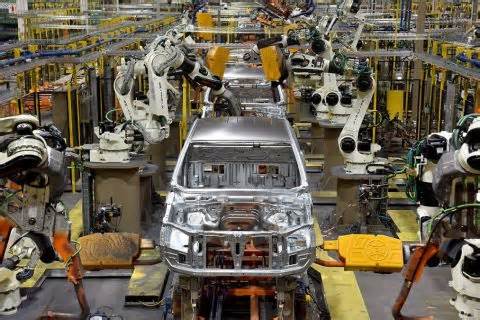Sources told Bridge Michigan that the state investment automaker’s request for the allocation will be heard at a special Michigan Strategic Fund meeting at 12:30 p. m. M. del Monday.
Meanwhile, Ford has a press conference scheduled for 1:45 p. m. m. in his Ford Ion Park in Romulus, though corporate officials did not verify the announcement Friday night.
However, the automaker said in an email that the event focuses on its development of electric vehicles and news “about how Ford, the second-largest electric vehicle company in the U. S. , is being able to develop electric vehicles. “. “
The reports, which add from Crain’s Detroit Business, imply that the Michigan central plant will be a lithium-iron phosphate plant planned through Ford and Chinese battery Contemporary Amperex Technology Co. Ltd. (CATL), with estimates ranging from $2. 5 billion to $3. 5 billion.
If so, the allocation promises about 2500 new jobs and will increase Michigan’s percentage of electric vehicle advancement development as the auto industry seeks $76 billion in new services in the U. S. It is growing from 20 existing electric vehicle models to two hundred by 2030.
So far this year, the state has secured $13 billion in battery and electric vehicle production projects and announced nearly 13,000 new car jobs, according to Gov. Gretchen Whitmer, who did not verify the agreement with Ford late Friday.
Whitmer’s spokesman, Bobby Leddy, said in an email that he simply can’t “speculate on quick projects,” but touted industry incentive legislation Whitmer had signed in the past.
Michigan is experiencing an “economic boost as we win deal after deal to grow our economy, create good-paying jobs and bring critical chains from China back to Michigan,” Leddy said.
Details of Ford’s plans to expand a battery plant for electric vehicles were made public in January when Virginia Gov. Glenn Youngkin said his management had halted Ford’s efforts to expand it there because of considerations about the Chinese Communist Party’s influence on the project. At the time, Michigan gave the impression of being Virginia’s only competitor for the project.
Efforts to expand the Marshall property, assembled over the years as a potential megasite, came through state and local economic development officials last year when they added contract acres and began preparing the site to be ready.
The assets are located south of I-94 on rural land just west of Marshall in Marshall Township, about 12 miles east of Battle Creek. Site preparation was facilitated through state investments through large-scale progression incentives that became imaginable last January through the $1. 6 Strategic Scope and attraction reserve fund (SOAR).
The SOAR fund was introduced in the fall of 2021 after Ford chose Kentucky and Tennessee to invest $11. 4 billion in electric vehicles, bypassing its home state and raising fears that Michigan could lose its auto advantage if automakers continued to build in the South.
James Durian, executive director of Select Marshall, an economic development agency, led Marshall’s preparedness effort. He did not respond to Bridge’s request for comment Friday.
However, in an interview with Bridge last spring, he said any progress promises “thousands of new jobs for the area” in an effort to increase Calhoun County’s tax base.
Opposition to progression in Marshall has grown over the past month as citizens have mobilized against Choice Marshall’s efforts to gain farmland as part of assets and annex amounts of it to the city of Marshall to allow for the delivery of public services. The city of Battle Creek has spoken out in favor of annexation, saying it will supply water to assets.
However, dozens of others filled Marshall Township Hall in January when the council voted to go ahead with annexation, according to a report by the Battle Creek Enquirer.
Rebecca Glotfelty, a member of the organization opposing the project, told Bridge on Friday that she advised against Ford appearing to be making plans for a large plant on the property.
“Marshall will lose 1,800 acres of farmland and wilderness if this plan goes ahead,” he said, adding that “this allocation should not be thought of as in this location or any other rural place when there are vacant commercial sites in the state. “
The allocation deserves to be facilitated through government incentives, adding at least some through the SOAR Fund.
There is about $200 million left in the SOAR fund, which is designed to help the state attract big development projects, but the Whitmer administration and Democratic legislative leaders must burden more.
The Michigan House of Representatives narrowly approved a package of tax breaks Thursday that would also funnel up to $500 million a year in tax revenue to the SOAR fund.
Whitmer pushed for the annual allocation to create a sustainable source of investment for the incentive program. The state Senate is expected to vote on the bill Tuesday.
Covering the intersection of business and politics, and informing Michigan employers and staff about the long road to the return of the coronavirus.
Thanks to the Business Watch sponsor:
Support Bridge’s nonprofit civic journalism. Make a donation today.
We are just a news agency, we are also your neighbors
We’ve been here for you with the daily news from Michigan COVID-19; Report on the emergence of the virus, daily figures with our tracker and dashboard, the explosion of unemployment and, despite everything, we were able to report on the large distribution of vaccines. We report because the news affects us all. Would you like to please our non-profit newsroom?

